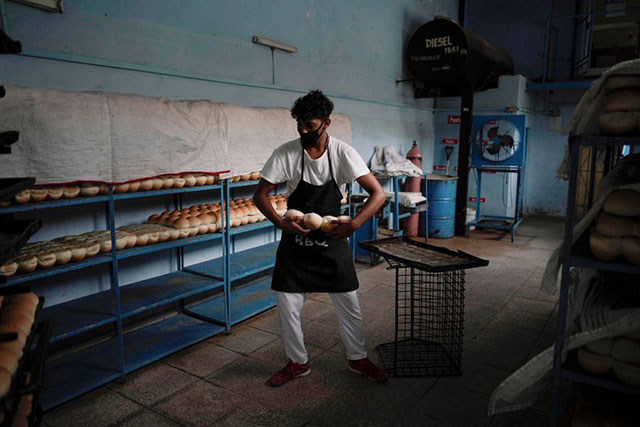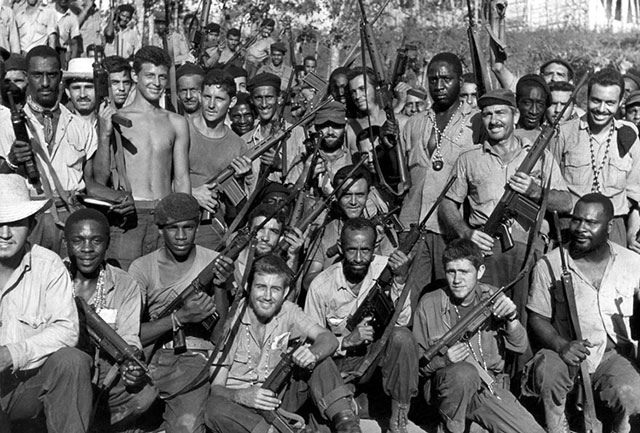
July 2021
U.S. Blockade of Cuba: “Bring About Hunger, Desperation, Overthrow”

Effects of the blockade: bakery in Havana in May 2021. Today we have bread. Tomorrow?
(Photo: Alexandre Meneghini / Reuters)
It would be difficult to exaggerate the hardships caused by the U.S. “embargo” on trade with Cuba that has sought to strangle the island for over six decades. This measure of economic warfare was condemned by the United Nations General Assembly on June 23, as it has been every year since 1992 (and numerous times before then). This year the vote was 184 to 2, with only the U.S. and Israel voting against. Particularly since the counterrevolution of 1991-92 in the USSR put an end to Soviet aid, the blockade has meant that basic products like toothpaste have often been unavailable to working people. But since the U.S. further tightened the embargo in 2017, and from March 2020 on, the cutoff of tourism following the outbreak of the COVID pandemic slashed Cuba’s sources of hard currency needed to keep the economy and basic services functioning. That has meant endless hours standing in lines under broiling sun and drenching downpours to get groceries, medicines and bread.
From the outset, U.S. economic sanctions on Cuba were intended as punishment for having made a revolution. The aim was to bring down the regime by inflicting excruciating economic pain on the population. This was laid out in an internal memo by the Deputy Assistant Secretary of State for Inter-American Affairs on 6 April 1960 that called for “denying money and supplies to Cuba, to decrease monetary and real wages, to bring about hunger, desperation and overthrow of government.”1
This came only weeks after the Republican administration of
Dwight Eisenhower began planning for the Bay of Pigs invasion.
That mercenary gusano invasion was carried out by
Democratic president John F. Kennedy and spectacularly
defeated as Castro led workers militias into battle at Playa
Girón. Having failed to crush the Revolution by force of arms,
JFK ordered an embargo on trade with Cuba and turned to
mounting terrorist attacks on the island.2

Workers militia members celebrate victory over the Bay of Pigs mercenary invaders, pinned down at their beachhead at Playa Girón, April 1961.
(Photo: Bohemia archive)
The blockade (it was more than just a trade embargo) continued under executive orders by successive U.S. presidents, until Democrat Bill Clinton turned it into law and intensified it in the 1992 Cuban Democracy Act and the 1996 Cuban Liberty and Democratic Solidarity (Helms-Burton) Act. While some travel restrictions were eased when Democrat Obama reestablished diplomatic relations in 2015, in 2017 and 2019 Republican Trump imposed a slew of new sanctions (known in Cuba as the infamous “243 measures”) that intensified the blockade. This includes a cap on remittances from Cuban exiles to relatives, suits in U.S. courts over confiscated property in Cuba under Title III of the Helms-Burton Act, and targeting Venezuelan oil shipments to Cuba by imposing sanctions on shippers. Together with the U.S. assault on the Maduro government in Venezuela, this has sent Cuban imports of oil from there plummeting from 90,000 barrels a day in 2015 to 51,000 after 2017 to barely 25,000 barrels a day in June, causing huge shortages in every field.3
U.S. imperialism has long used economic blackmail as part of its arsenal. Richard Nixon and Henry Kissinger went after Salvador Allende’s Unidad Popular government in Chile, vowing to “make the economy scream” on the way to the bloody 1973 Pinochet coup. Jimmy Carter used the “food weapon” – a grain boycott against the USSR – in response to Soviet intervention in 1980 to defend a reform government in Afghanistan under attack by U.S.-backed mujahedeen (holy warriors). Trump sought to squeeze Cuba by using intensified sanctions and the economic toll of the COVID-19 pandemic, particularly the loss of tourist dollars, to provoke popular discontent. The Biden administration has not changed Trump’s policy one bit. Last year, as the Cuban economy shrank by 11%, Cuban imports plummeted by 34% in the first eight months, leading to severe shortages of milk, butter, chicken, cooking oil, rice, corn and beans.4
Added to this is the functioning of the capitalist world market. Cuba normally imports about 70% of its food. Wheat to produce bread and pasta does not grow in Cuba’s tropical climate, the most productive milk cows require imported fodder, and output from Cuba’s underperforming agriculture has been declining since 2017. On top of the drastic fall of Cuba’s hard currency earnings and reserves, the cost of food internationally has risen more than 30% in the last year, according to the United Nations Food and Agriculture Organization. Wheat was selling at $280 a ton in April 2021, up from $220 a year earlier; the price of chicken drumsticks doubled from January to April. Plus “the cost of international container shipping is up as much as 50% over the last year and bulk freight more.”5 The result: “Cuba is facing its worst shortage of food since the 1990s” (Economist, 3 July).
In response to the July 11 protests, Mexican president Andrés Manuel López Obrador declared that “if one wanted to help Cuba, the first thing that should be done is to suspend the blockade of Cuba.” Today, many liberal Democrats and even some conservative Republicans have called to end the embargo. In March, 80 Democratic members of Congress called for lifting the “cruel” sanctions. But thanks to Democrat Clinton, the sanctions are law, and the chances of a repeal passing the U.S. Congress – where gusano Republicans (Marco Rubio, Ted Cruz, Ileana Ros-Lehtinen, Mario Diaz-Balart) and Democrats (Senate Foreign Relations Committee chair Robert Menendez) have a hammerlock on Cuba policy – are exactly zero. Campaigning against Trump, Joe Biden said he would reverse polices that “have inflicted harm on the Cuban people,” but following the recent protests the Democratic U.S. president refused to lift any of Trump’s measures.
As we warned even as many leftists were calling to put him in the White House, Biden is an inveterate anti-Communist war hawk.6 Since taking office he has worked to step up tensions with Russia, and especially to escalate the war drive against China, the largest of the remaining deformed workers states. He is also worried about losing Florida to the Republicans in the 2022 midterm elections. It should be no surprise, then, that his response to the Cuba protests has been to double down on the economic blockade, denouncing Cuba as a “failed state” and Communism as a “failed system,” and now preparing new sanctions. Biden’s refusal even to lift limits on remittances to family members in Cuba (which mainly go to opponents of the government) is a clear sign that U.S. policy continues to be to strangle Cuba economically, hoping to “bring about hunger, desperation and overthrow of government.”
The Cuban government has always sought “peaceful coexistence” with U.S. imperialism, a Stalinist pipe dream that will not happen. The League for the Fourth International calls to break the blockade and to oppose the U.S.’ “pandemic extortion” that seeks to further impoverish the Cuban population. But as skyrocketing costs of food, fuel and transportation underscore, the stranglehold of imperialism is not limited to a single measure or set of policies but is also the result of the dictates of the capitalist world market. Cuba cannot escape from this relentless siege by vainly seeking to conciliate the Yankee overlords, who with their Cuban henchmen would turn the island back into the neo-colony it was from the 1898 U.S. invasion until the 1959 Cuban Revolution. To break from the imperialist clutches requires the aid of the other workers states (Vietnam and particularly China), and above all extending socialist revolution throughout the hemisphere. ■
- 1. See Foreign Relations of the United States, 1958–1960, Cuba, Volume VI.
- 2. See Salim Lamrani, The Economic War Against Cuba (Monthly Review, 2013).
- 3. “¿Qué está causando la aguda escasez de combustible en Cuba?” Notimérica, 24 September 2019; “What the Protests in Cuba Have to Do With Venezuela,” Caracas Chronicles, 13 July; “How Venezuela's Oil Crisis Triggered Mass Protests In Cuba,” OilPrice.com, 14 July.
- 4. See “Cuba Is Running Out of Food,” Institute for War & Peace Reporting, 7 January.
- 5. “Soaring International Prices Aggravate Cuban Food Crisis,” Reuters, 20 May.
- 6. See “Repression Elections 2020,” The Internationalist No. 61, September-October 2020; and “Democrat Biden’s Regime: Cold War and Racist Repression,” The Internationalist No. 62, January-March 2021)
“Cuba Is Being Accused of Many Things – Let’s Fact Check Them”
